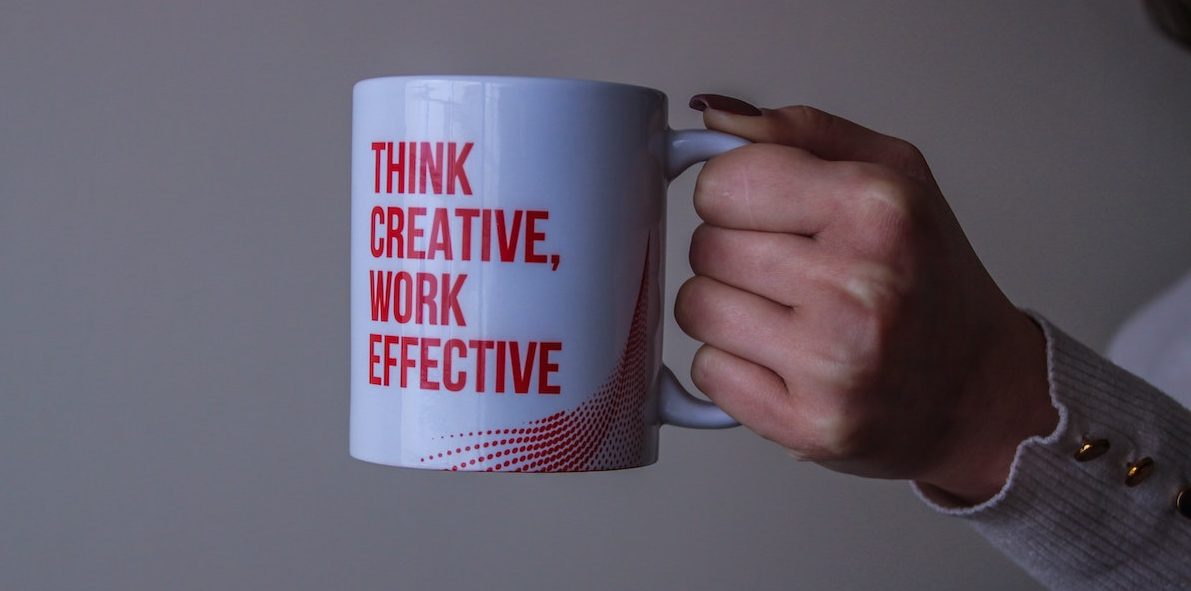
When you’re evaluating your hotel marketing strategy and budgets, you’re likely facing a big decision: do you dedicate more funds to content creation or paid ads? Is there a right or wrong decision? Which serves hospitality businesses better?
Unfortunately, there’s not an easy answer to any of those questions. Deciding where to allot money for marketing is a personal decision based on your hotel brand identity and needs.
Although we can’t give you a black and white response, we can help you understand more about each type of marketing. Let’s talk about the differences between content marketing and paid advertising, then dive deeper into each one.
Hopefully, this piece will help you understand what your hospitality business truly needs more - and where your spending should go when it comes to digital marketing for hotels.
The Difference Between “Content Marketing” and “Paid Advertising”
If you’re not super familiar with the ins and outs of digital marketing, the distinctions between content marketing and paid advertising may be fuzzy. Let’s break it down.
Think about how all resorts are hotels, but not all hotels are resorts - the same applies to “marketing” and “advertising.” All ads are technically a part of a content marketing strategy, but not every piece of content needs to be a direct ad for your hospitality business.
Content marketing is, in a large sense, storytelling. It’s the tale you spin about your hotel, restaurant, or tour business. You’re sending messages out to your customers - some are advertorial while others are informative, entertaining, or engaging.
Advertising, on the other hand, is very specific. You’re encouraging travelers to spend their money with you through targeted messages and offers.
Don’t ask “Which kind of hotel sales strategies should I spend more money on?” Ask, “What do I currently need to do more: attract direct leads and conversions, or establish my hotel brand identity and unique story?”
So, that’s the big difference between advertising and marketing (in a nutshell). Now it’s time to talk specifically about hospitality content marketing - and why it’s important for you.
The Ins and Outs of Content Marketing
“Content marketing is relevant and useful storytelling that captures the interest of your specific audience and helps them solve their problems.” - Search Engine Journal
When travelers are looking for their perfect getaway or their first vacation dinner reservation, they aren’t just looking for well-placed ads. They want to be educated and convinced on why they should spend their money with your business rather than another.
Content marketing allows you to reach travelers without actually asking them to book with your brand. Your blog posts, interviews, and social media posts all help people become aware of your business without viewing a direct advertisement.
An added bonus: content marketing also puts you in front of search engines, which can boost your SEO and therefore strengthen your overall online presence.
As a hospitality business, you have a variety of choices when it comes to content marketing styles and hotel sales strategies, including:
- Blogging
- Creating videos
- Podcasting
- Writing long-form content
- Publishing listicles
- Providing travel checklists
In order for hotel marketing ideas to work, travelers must first be aware of your brand - and content marketing helps with that. To show you what we mean, here are some excellent marketing examples from hospitality businesses around the world.
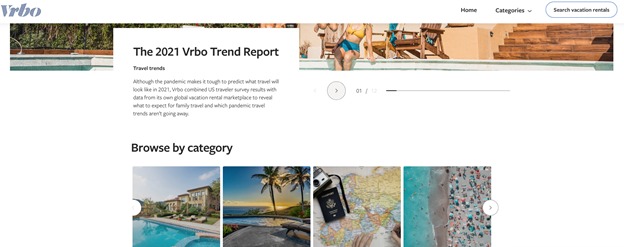 Image Source: VRBO
Image Source: VRBO
VRBO is a growing competitor of Airbnb - a site that offers vacation rentals all around the world. Not only do they rank highly in search results with their various listings, but they also draw attention via their brand blog.
In their blog, VRBO highlights travel trends, great rentals, and tips and tricks for vacationers. It’s a great way to draw readers in without directly advertising their rentals. People can drop by for information or a quick read, but stay for the brand’s real offers.
Similarly, The Standard Hotel has taken a behind-the-scenes approach to drawing potential customers in with interesting content.
People love engaging with content that teaches them about a brand. Like this video, you can create content that reveals who runs your business, what makes it tick, and why customers should support your initiatives and products.
Remember: blog posts and videos aren’t the only kinds of content out there. Podcasts have grown enormously in popularity - and for good reason. They’re easily accessible and perfect for listeners on the go.
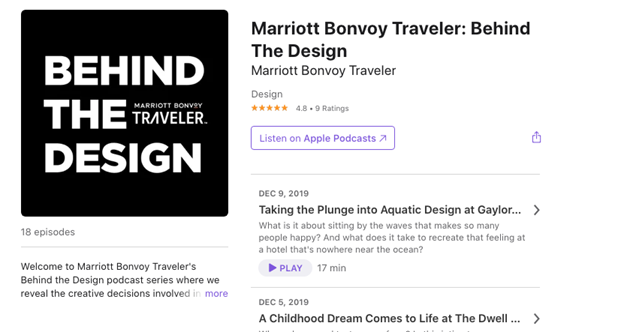 Image Source: Apple Podcasts
Image Source: Apple Podcasts
You might have heard about Marriot Bonvoy Traveler’s podcast, Behind The Design.
This audio production goes behind the scenes of one of the most well-known hospitality brands to talk about their creative choices, designs, and branding. It’s in no way a direct advertisement, but it certainly helps listeners understand and appreciate Marriot more.
As we mentioned before, the ultimate goal of hotel marketing strategy content is to tell your brand’s story. Whatever your hospitality business might be, there’s a tale to tell of your background, goals, offerings, and more.
Successful Results of Content Marketing
Content is posted every day in overwhelming numbers. So, if you’re going to employ content creation as a form of digital marketing, how can you differentiate your pieces from the rest of the hospitality blogs and noise that’s out there?
In our experience as a hospitality marketing agency, a truly successful content strategy achieves four things:
1) It educates readers through ideas, statistics, advice, and more.
2) It focuses on more than just selling.
3) It aligns closely with your hospitality business’s ultimate goals and morals.
4) It connects with travelers and customers on a personal level.
However, you need to know more than just what works - you need to know what content marketing costs for a brand like yours.
How Much Does Content Marketing Cost?
Although a content marketing tactic can draw attention, it’s only successful if it’s worth what you paid for it. That’s where calculating ROI for your strategies comes into play.
It’s impossible to give you a straight answer as to how much the average content marketing strategy costs. What we can give you is the magic formula for understanding what your particular strategy is costing you - and how effective it is.
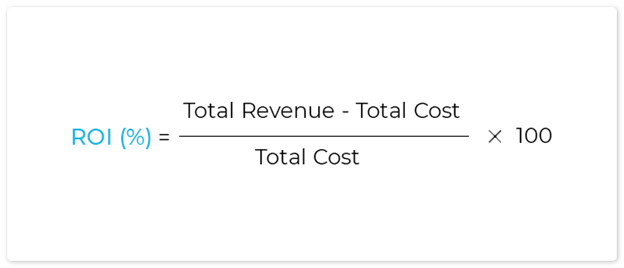 Image Source: iSpring Solutions
Image Source: iSpring Solutions
As iSpring Solutions shows, your “return on investment” (ROI) is the total revenue content marketing brings in, minus the total cost and divided by that same number. Then, multiply your sum by 100 to find the ROI percentage.
For example, let’s say a hotel puts out a series of blog posts that cost $300 to write and post. They then make $700 in bookings from those posts. The ROI of that content campaign would be 133% - which is well worthwhile.
In general, research has found that content marketing is an extremely powerful way to bring in more demand and boost lead generation for hotels.
Well, in short, that’s everything you need to know about content marketing! Now, let’s talk about the flip side of the equation: paid advertising.
The Ins and Outs of Paid Advertising
In the simplest of terms, paid advertising puts your business directly in front of potential customers. You can place ads on social media, search engine result pages, YouTube, review sites, other websites, and many other places.
“Pay-per-click advertising”, or “PPC,” is a type of paid campaign that is most commonly used to drive traffic and revenue.
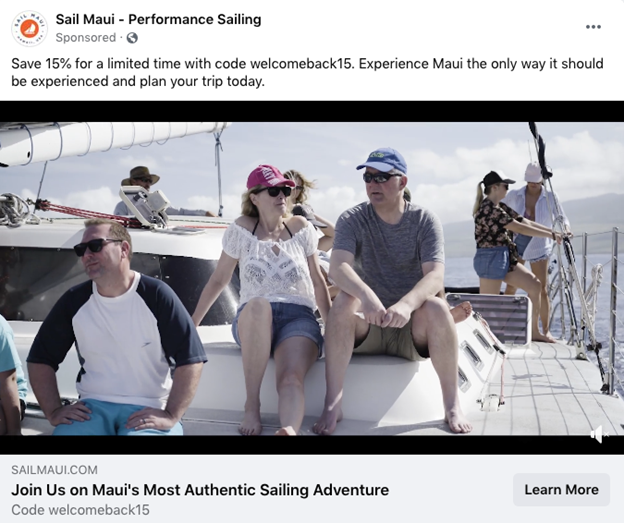 Image Source: Facebook Ad for Sail Maui
Image Source: Facebook Ad for Sail Maui
For example, those ads you see from other hospitality businesses on Facebook or Instagram? Those are paid advertisements - and they’re often very effective.
At least 53 percent of travelers have found inspiration on Facebook. If you want to get in front of vacationers to sell your products, you need to go where they’re spending time.
You can also place paid ads directly at the top of search results for travel planners. For instance, if someone searches “Best Places to Stay” on Google, ads like this one for Aulani, a Disney resort on Oahu, come up. These are paid SERP ads.
 Roughly one-third of people click on a paid ad because it directly answers their search query. Between Google ads and Facebook ads, they take up the most digital ad spending compared to other contenders.
Roughly one-third of people click on a paid ad because it directly answers their search query. Between Google ads and Facebook ads, they take up the most digital ad spending compared to other contenders.
Successful Results of Paid Ads
At first glance, paid ads seem a bit more effective than content marketing. After all, they’re direct, in-your-face sales for your brand.
It’s true - paid online advertising is super effective for hospitality businesses. You can really target specific consumer groups and decide where you want to spend your marketing budget. Your decision to advertise with one platform or site over another can pay off.
For instance, let’s say your hotel runs a Google Ad campaign through a hospitality marketing agency. It’s estimated that for every dollar you spend on that ad, you’ll make at least $2 back. That’s an ROI of 100 percent - something that many marketing teams spend forever trying to achieve.
Additionally, a study from D-Edge found that bookings generated by ad-driven campaigns increased by a whopping 200 percent between 2013 and 2019.
How Much Does Paid Advertising Cost?
The answer depends, but it’s not uncommon to spend thousands of dollars per month on paid ads. The average small business dumps around $10,000 per month on advertising campaigns, but obviously, this number can vary greatly based on your target topics, keywords, platforms, etc.
When it comes to creating a paid ad budget for your hospitality business, you need to evaluate one thing most heavily: the cost versus the performance. What PPC choices are affordable but powerful? Where can you get the biggest bang for your buck based on your brand?
For many travel businesses, review sites and social media platforms provide excellent value for paid ads. Look into the prices for your top choices and determine what hotel marketing ideas work best for you.
Comparing the Two
Now, we get to the big part of this article: comparing the total effectiveness of these two marketing methods. Which can you benefit from the most - and how?
Let’s conduct a direct comparison between content marketing and paid advertising, related to hospitality marketing strategy and revenue.
1. Which Is More Cost-Effective?
In general, content marketing is roughly 62 percent less expensive than outbound marketing, which makes it the more affordable choice of the two. However, the effectiveness of a hotel marketing strategy depends on a variety of other factors.
2. Which One Will Get Me More Leads?
Surprisingly, content marketing can potentially bring in three times the number of leads than paid search advertising can find. That’s a big ROI, and plenty of leads to work with for a fairly low production price. However, leads from paid ads will normally come quicker.
3. Which Is More Necessary?
Well…. This is a highly debated question, by marketing experts around the globe and in various industries. The truth is, there’s no right or wrong answer to this question. It all depends on your hospitality business, your goals, and your customers.
What our digital creative agency experts can say is that it’s very important to pay attention to the times. This will often dictate the kind of content most necessary for the coming months or years.
In the hospitality industry, we’re currently dealing with unprecedented circumstances due to COVID-19, travel restrictions, and health concerns. Your marketing tactics must take these concepts into account. Otherwise, you risk sounding incredibly tone-deaf as you put out paid ads for vacations people can’t safely take.
Right now, we’ll go out on a limb and say that content marketing might be a tad bit more necessary than paid ads in the hospitality industry, simply because of the strange conditions of travel today. You need to address what’s happening while also revealing how your brand is dealing with it and how people can safely get their travel fixes in the near future.
Content marketing is all about education and awareness - and right now, that’s what your customers will likely benefit from (and react to) the most.
That’s not to say that there’s no reason to use paid ads. It’s just that, at this moment, content marketing might prove more necessary and effective.
4. How Can I Get the Best of Both Worlds?
For many people, paid content creation is an optimal mix of both paid ads and content marketing. Working with influencers often falls under the category.
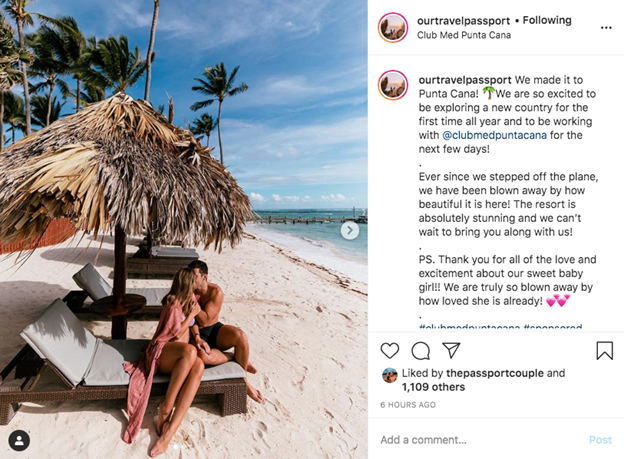 Image Source: Our Travel Passport Instagram
Image Source: Our Travel Passport Instagram
Many hotels, restaurants, tour groups, and even airlines work with social media influencers to create travel content that informs - and sells. With Instagram as the fastest growing social media channel, it’s a great place to reach travelers and vacation planners.
In Conclusion
At the end of the day, hospitality marketing is never going to be a one-size-fits-all deal. It all depends on what you need - what you’re wanting to spend, what your goals are, and your hotel brand identity.
In many cases, a combination of content creation and paid ads is a smart way to find out what works best for your business. Experiment with different methods and do research to understand what your target consumer group really wants.
At LURE Agency, we’re all about building relationships and maximizing your revenue with smart marketing. Reach out if you have questions or need help setting up hotel sales strategies. Our digital creative agency is here to help.


